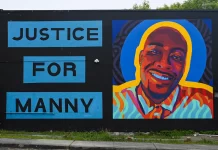RIZELLE ROSALES, CAMILLE LEMKE, and DEJAN PEREZ; mast@plu.edu
Virak Pheng
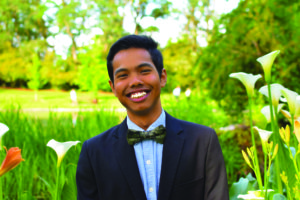
Many describe junior Virak Pheng in two words: “kind” and “busy.” The latter can be attributed to the workload that comes with being a philosophy and environmental studies double major and a nonprofit administration and religion double minor.
Pheng originally began as at Pacific Lutheran University as a physics major, but Pheng found his vocation during his study away in Southeast Asia: to become an environmental ethics lawyer. “Part of me just wanted to go back to where I grew up, but I gained something more,” he recalled. “It was a life-changing experience.”
His schedule also includes being heavily involved in his Cambodian community. Pheng works within the Cambodian Cultural Alliance of Washington, helping in the annual New Year’s Festivities held at the end of April. “A lot of the Cambodians here don’t speak the language and a lot of Cambodian elders here don’t speak English, so I can bridge them up,” said Pheng.
As for being kind, Virak holds that care so ingrained in the PLU mission statement in his heart and everything he does. “I always try to be kind to others. I feel like no matter what you want to do in life, as long as you are kind to others, opportunities will arise,” Pheng said. “As long as you are passionate about what you are doing, working hard and being kind to others, there’s always a connection. And also you’ll probably inspire other people, too.”
Haley Hurtt
Looking at life: switching the lens from biology to literature
In the chaos of college, students often face the challenge of choosing just one passion to pursue. Junior Haley Hurtt has balanced being a member of the University Chorale and a biology major for most of her time at Pacific Lutheran University.
“As far as I’m aware, I was one of only three science majors within the whole group, certainly not any other bio students,” said Hurtt. “But I’ve always done choir. I’ve done choir since fourth grade or something like that, so it’s a part of my identity that I don’t want to lose.”
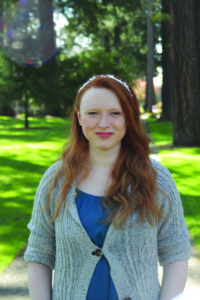
Hurtt’s pursuit of a biology degree competed for time and dedication against Chorale within her schedule., but she was able to manage both for her first three years at PLU. After taking an environmental literature class, Hurtt was surprised to find that biology and literature had more in common than she thought, excercising the same muscles of deep analysis and fascination with examining life. So after three years of biology, Hurtt switched to a literature major. After talking to Assistant Professor of English Adela Ramos, Hurtt learned that there are a lot of biology majors that do well in literature. “That was really interesting to me because I had never made a correlation between any hard science major and any humanities major,” she recalled.
Hurtt described making the switch as a bold move, but a necessary one. By taking a heavier course load and possibly some summer classes, Hurtt will graduate as scheduled in the spring 2018 with her sights set on environmental literature. Looking ahead, she’s applying for opportunities across the world, including a journalism internship focused on researching global poverty, working with MultiCare in Tacoma to improve healthcare for women, and applying for a study away trip to Uganda to work with animals. For her, this is not a compromise, but finding a balance between every aspect of her passions and identity.
Fasika Zewdie
Stockholm to Tacoma to Paris
One of the core values that govern Pacific Lutheran University is the emphasis on global perspectives, which is what led senior Fasika Zewdie to Tacoma all the way from Stockholm, Sweden.
“Studying in the U.S. has been my dream since I was a child… I wanted to make my dream come true,” Zewdie said.
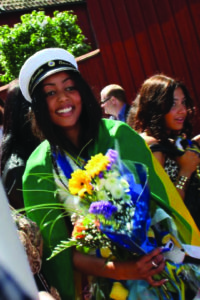
The story began thirty years ago, when her parents immigrated to Sweden from Ethiopia. Being raised in a bicultural household informed her perspective on culture and diversity: in the middle of a bustling Scandinavian metropolis, she was able to learn and practice the traditional Ethiopian customs of her parents. Zewdie experienced the essential duality between individualism and collectivism, growing up in a European capitalist society and being raised by her parents who were from a family-oriented African culture. This unique upbringing cultivated her interest in cultural studies and social science.
After studying religion and cultural geography at the University of Stockholm for two years, Zewdie decided she wanted to pursue sociology in the United States. Since coming to PLU, Zewdie has been able to get the educational experience she was searching for. “I love PLU. This university is small, and it allows you to build that close kind of relationship with professors. You get to know everyone.”
She learned to speak the Ethiopian language of Amharic in her household, along with Swedish and English. Now, Zewdie is taking French at PLU, expanding her cultural skill set. “Since I’ve studied things like sociology and religion, I sometimes can understand people better — their perspective and ideas, I can understand where it comes from. That really interests me.” Since coming to Tacoma, Zewdie has taken interest in immigration issues. After an internship with Advocates for Immigrants in Detention Northwest last semester, Zewdie plans on working on improving immigration policies in her future career. After graduating in May, Zewdie will be moving to Paris, France to continue her vocation in cultural studies and travel. Though she may be graduating from PLU, she’ll be taking with her the values of global diversity and social science… and her vocabulary from French 102.
Samantha Hoskins
Growing up a “third culture kid”
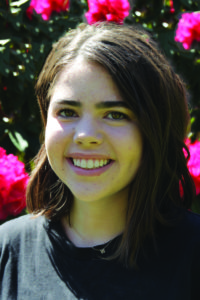
Born in Singapore, raised in Japan and a citizen of the United States of America – an amalgam of experiences that has lead first-year Samantha Hoskins to identify as a “third culture kid.” A third culture kid, Hoskins explains, is a person who grows up in a culture that is not their parents’ home cultures. Both of Hoskins’ parents are teachers at international schools. “It really explains the phenomenon that you don’t really identify with your home country, but not really identifying with the country you reside in. But you’re in this really weird, limited space between each country,” Hoskins says.
In her experience, many people are shocked or surprised when she explains her upbringing because she is not ethnically Japanese. “There’s like this muddled confusion,” she explains. “It’s weird for people at first and it’s weird to explain it, too.” Hoskins sometimes feels the differences in Japanese and American culture, such as social norms and customs. However, the international school that she attended in Tokyo prepared her to be a compassionate and inquisitive global learner.
Hoskins is pursuing global studies and anthropology in hopes of applying her perspectives to international politics. “I feel like having to balance between a bunch of different perspectives and identities has made me more aware of other people’s identities,” Hoskins says. “I think maybe they’re trying to balance their identities as well, so I try to figure out where people are in understanding themselves while trying to figure out myself.




















